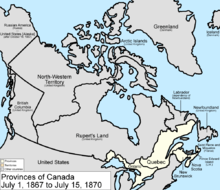
Back Territori del Nord-oest Catalan Nordwestliches Territorium German Βορειοδυτική Επικράτεια Greek Territorio Noroccidental Spanish Territoire du Nord-Ouest French Territorio del nord-ovest (Gran Bretagna) Italian Šiaurės Vakarų teritorija (Kanada) Lithuanian Terytoria Północno-Zachodnie (kolonia) Polish Território do Noroeste (América do Norte Britânica) Portuguese Северо-Западная территория (Канада) Russian
| North-Western Territory | |||||||||||
|---|---|---|---|---|---|---|---|---|---|---|---|
| Territory of British North America | |||||||||||
| 1670–1870 | |||||||||||
 Map of North-Western Territory, including more of Rupert's Land | |||||||||||
 Map of North-Western Territory, including less of Rupert's Land | |||||||||||
| • Type | Colony under de facto company rule | ||||||||||
| Historical era | Age of Discovery | ||||||||||
• Established | 1670 | ||||||||||
• Disestablished | 15 July 1870 | ||||||||||
| |||||||||||
| Today part of | the Canadian provinces / territories of: Alberta British Columbia Northwest Territories Nunavut Saskatchewan Yukon the U.S. state of: Alaska | ||||||||||
The North-Western Territory was a region of British North America extant until 1870 and named for where it lay in relation to Rupert's Land.
Due to the lack of development, exploration, and cartographic limits of the time, the exact boundaries, ownership, and administration of the region were not precisely defined when the territory was extant. There is also not a definitive date when the British first asserted sovereignty over the territory. Maps vary in defining the boundaries of the territory; however, in modern usage, the region is generally accepted to be the region bounded by modern-day British Columbia, the continental divide with Rupert's Land, Russian America (later Alaska), and the Arctic Ocean. The territory covered what is now the Yukon, mainland Northwest Territories, northwestern mainland Nunavut, northwestern Saskatchewan, and northern Alberta.
The North-Western Territory was not technically within the area of land granted to the Hudson's Bay Company in May 1670, as the region did not drain into Hudson's Bay.[1] However, the Hudson's Bay Company (HBC) was still the de facto administrator of the region and the territory was included in the same process of transferring Rupert's Land to Canada from the HBC, effective on July 15, 1870.
- ^ "The Royal Charter of the Hudson's Bay Company". HBC Heritage. Archived from the original on 7 October 2015. Retrieved 5 October 2015.
